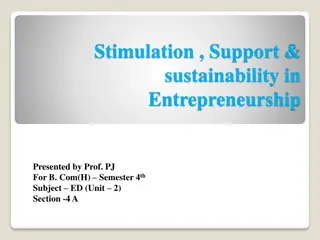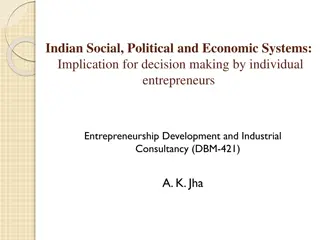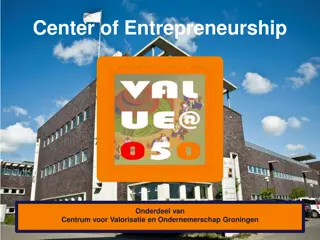Understanding Entrepreneurial Development and Characteristics
An entrepreneur is someone who takes risks to create a new business venture and brings innovative ideas to the market. Success in entrepreneurship brings rewards, while failure can lead to losses. Characteristics of entrepreneurship include profit chances, creativity, innovation, and risk-bearing. Entrepreneurs play a crucial role in economies by anticipating needs and driving growth.
Download Presentation

Please find below an Image/Link to download the presentation.
The content on the website is provided AS IS for your information and personal use only. It may not be sold, licensed, or shared on other websites without obtaining consent from the author. Download presentation by click this link. If you encounter any issues during the download, it is possible that the publisher has removed the file from their server.
E N D
Presentation Transcript
ENTERPRENEURIAL DEVELOPMENT-16CCBB15 Submitted Submitted by by Ms.R.KAVERI,MBA.,M.Phil Ms.R.KAVERI,MBA.,M.Phil., ., Assistant Professor, Assistant Professor, Department of Business Administration, Department of Business Administration, S.T.E.T Women's College, S.T.E.T Women's College, Mannargudi. Mannargudi.
Introduction: An entrepreneur is a person who organizes a venture to benefit from an opportunity, rather than working as an employee. Entrepreneurs play a key role in any economy. These are the people who have the skills and initiative necessary to anticipate current and future needs and bring good new ideas to market. Entrepreneurs who prove to be successful in taking on the risks of a start-up are rewarded with profits, fame and continued growth opportunities. Those who fail suffer losses and become less important in the markets. Many fail, lose money, and close the business.
What Is an Entrepreneur? An entrepreneur is an individual who creates a new business, bearing most of the risks and enjoying most of the rewards. The entrepreneur is commonly seen as an innovator, a source of new ideas, goods, services, and business/or procedures. Entrepreneurs play a key role in any economy, using the skills and initiative necessary to anticipate needs and bring good new ideas to market. Entrepreneurs who prove to be successful in taking on the risks of a start-up are rewarded with profits, fame, and continued growth opportunities. Those who fail, suffer losses and become less prevalent in the markets.
Definition: An Entrepreneur is a person who has a role of an industrialist and forms an organization for the commercial use. He is a change agent who transforms the demand into supply by forecasting the needs of the society.
Characteristics of Entrepreneurship 1.Profit Chances The chances of profit are the level of return to the person who is taking risks and developing an idea into its business venture. The actions of the entrepreneurs will likely remain abstract and a paper leisure activity without the potential of the profit. 2.Creativity and Persuasiveness There is a need to have the creative capacity for recognizing and pursuing the opportunities in a successful entrepreneurship. The entrepreneurs should possess great selling skills and be persistent 3.Innovation The entrepreneurship continuously demands a continuous search for innovative ideas. The entrepreneur should evaluate the present modes of business operations for developing more efficient and effective systems. In a simple definition, it is a continuous effort for optimization of performance in an organization.
4.Risk Bearing As we defined above, the entrepreneurship is the willingness to take risks. The individuals should arise out of the implementation and creation of the creative ideas. They should believe that new ideas take some time to offer results and their results may not be instantaneous. 5.Vision Probably, one of the biggest responsibilities of the entrepreneur is to decide the direction of the business. There is a need to have proper vision. If a company doesn t have this, they will likely get lost in the sea. 6.Excellent Business Skills A successful entrepreneur always has the ability to set up the internal procedures, systems, and processes required to operate a company. He/she should focus on sales, revenue, and cash flow all the times. They always evaluate the current talents and professional network.
Innovative Entrepreneur: These are the ones who invent the new ideas, new products, new production methods or processes, discover potential markets and reorganize the company s structure. These are the industry leaders and contributes significantly towards the economic development of the country. The innovative entrepreneurs have an unusual foresight to recognize the demand for goods and services. They are always ready to take a risk because they enjoy the excitement of a challenge, and every challenge has some risk associated with it. Ratan Tata is said to be an innovative entrepreneur, who launched the Tata Nano car at a considerably low cost. Imitating Entrepreneurs: The imitating entrepreneurs are those who immediately copy the new inventions made by the innovative entrepreneurs. These do not make any innovations by themselves; they just imitate the technology, processes, methods pioneered by others. These entrepreneurs are found in the places where there is a lack of resources or industrial base due to which no new innovations could be made. Thus, they are suitable for the underdeveloped regions where they can imitate the combinations of inventions already well established in the developed regions, in order to bring a boom in their industry.
Fabian Entrepreneurs: These types of entrepreneurs are skeptical about the changes to be made in the organization. They do not initiate any inventions but follow only after they are satisfied with its success rate. They wait for some time before the innovation becomes well tested by others and do not result in a huge loss due to its failure. Drone Entrepreneurs: These entrepreneurs are reluctant to change since they are very conservative and do not want to make any changes in the organization. They are happy with their present mode of business and do not want to change even if they are suffering the losses. Thus, this classification is done on the basis of the willingness of an entrepreneur to create and accept the innovative ideas.
Difference Between Entrepreneur and Intrapreneur As both entrepreneur and intrapreneur share similar qualities like conviction, creativity, zeal and insight, the two are used interchangeably. However, the two are different, as an entrepreneur is a person who takes a considerable amount of risk to own and operate the business, with an aim of earning returns and rewards, from that business. He is the most important person who envisions new opportunities, products, techniques and business lines and coordinates all the activities to make them real.
BASIS FOR COMPARISON ENTREPRENEUR INTRAPRENEUR Meaning Entrepreneur refers to a person who set up his own business with a new idea or concept. Intrapreneur refers to an employee of the organization who is in charge of undertaking innovations in product, service, process etc. Approach Intuitive Restorative Resources Uses own resources. Use resources provided by the company.
..Capital Raised by him. Financed by the company. Enterprise Newly established An existing one Dependency Independent Dependent Risk Borne by the entrepreneur himself. Taken by the company. Works for Creating a leading position in the market. Change and renew the existing organizational system and culture
Conclusion The term entrepreneur not only refers to the creator, owner and manager of a business, but also to the project leader of a business. To define the entrepreneur, two problems relating to the behavior of economic agents must be combined: methodological individualism, according to which economic agents are calculators, and the theory of resource potential, according to which the rationality of economic agents is embedded in a network of social relationships. In other words, the entrepreneur is an economic agent whose ultimate goal is to create a business from a well-defined project. To realize his project, he mobilizes a number of resources (knowledge-based, financial and relationship-based), from which he produces other resources (employment, innovation, etc.), interacting with his environment. In this sense, the entrepreneur is rational, because he maximizes his resources in order to achieve a goal, which is to create his own job. In this sense, his behaviour is opportunistic, because he seeks to take advantage of all the opportunities presented to him (a social relationship, a grant, a requirement, etc.). In these ...























